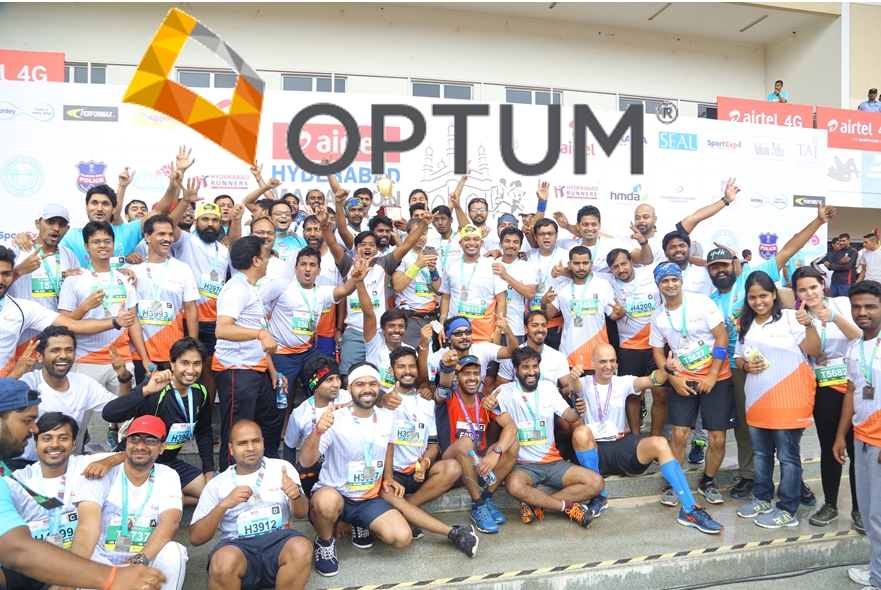The programme focussing on millennials and women, has been encouraging employees to participate in marathons.
Employee wellness has now become a larger concern for organisations than ever before, with sedentary lifestyles and increasing work stress taking over real fitness. However, what most organisations do to combat the situation is assign significant budgets to employee wellness programmes, which most often lack a structured format and a holistic approach. In the absence of attention to details, awareness and lack of time, businesses end up offering easy solutions for employees wellness, such as a gym membership. Sadly, that just remains a tick in the box.
Realising the need for a holistic employee wellness solution, Optum, an information and technology-enabled health services organisation, came up with a unique employee well-being programme called, ‘LiveWell’. In line with its mission to ‘Help people live healthier lives and make the health system work better for everyone’, the LiveWell programme drives a holistic wellness agenda among employees.
Kshitij Kashyap, senior director, human capital, Optum, who is himself a fitness freak, a sports enthusiast and an avid marathon runner, believes that one has to make it a discipline rather than treating it as a one-off activity. As part of the LiveWell programme and its targeted focus on millennials and women, Optum has been encouraging employees to participate in marathons. UnitedHealth Group, the parent company of Optum, even lifted the Airtel Half Marathon trophy for maximum participation, three years in a row. To achieve the same, the company runs structured programmes for its runners as well as endurance athletes to be injury free.
“Running a marathon is not a way to get healthier but it is the end-result of a healthy and balanced lifestyle,” says Kashyap. He explains that it is the continuous dedication to being fit and a combination of meditation, yoga, pilates, zumba and much more along with a healthy routine that ensures the well-being of their employees and prepares them for the marathons as well.
Kashyap believes that wellness is about fitness of the mind, body and soul. He shares that while the exercise regimes and marathons take care of the body, the mind and soul aspects—which are even more important—have to be included as part of the wellness programmes in organisations. More so, because the current generation faces huge stress and difficulty in sharing their worries with family or friends.
“Since convenience has overtaken health in the current times, it makes even more sense for organisations to give back to the employees, helping them pick up active and healthy lifestyles,” he opines. Sharing the benefits of a holistic approach to wellness, Kashyap explains that it certainly creates a positive work environment and the productivity also goes up as people feel more energetic and engaged.
“Even a simple activity, such as a daily walk challenge, can bring about a difference in how people interact in the workplace. We observed the water cooler conversations transforming from nonsensical politics and gossips to enthusiastic and competitive discussions, about who has been able to achieve the most steps in a day under the daily walk challenge,” Kashyap notes.
So far, under the LiveWell programme, over 2800 participants have taken part in the 2016 Step Up Challenge, walking an aggregate of 450 million steps, which is 220 per cent of the numbers in 2015. 50 per cent of its employees quit tobacco in all forms, under the Smoking Cessation programme—a really notable achievement and the highest ever by any programme of such a nature.
Besides, Kashyap shares that the excitement level with regard to the marathons has grown so much among the staff that even the leaders from various verticals compete with each other for the same. That creates a thrill amongst the staff, motivating them to participate and work towards the required fitness to be able to do so.
The LiveWell programme has been delivering exemplary ‘value on investment (VOI)’ for Optum. “Within four years of its inception and existence, the programme has been able to impact our employees and the organisation at large,” he says.
Talking of how the programme has helped enhance productivity and performance, Kashyap shares that marathons are an integral initiative of the physical wellness pillar of Optum’s charter. He adds that, “While you’d understand that marathons alone will not impact the productivity of employees— as there are other avenues that Optum provides to ensure a productive workforce—a recent internal survey in the organisation, revealed that more than 75 per cent of the employees felt that they were more productive at work owing to their better health.”
He further shares that it’s not just running or participating in the event that makes marathons important for Optum, but the regime that the employees follow to make their mark at the event that is a truly worthwhile journey. 28 per cent of the marathon participants from Optum revealed increased energy levels, while another 30 per cent admitted that they had reduced stress at work and at home because of their better lifestyle and exercise routine.
“A highly motivated and engaged workforce, with higher productivity has resulted in faster delivery of quality products and services for our clients, resulting in business savings for our business leaders. Besides this, reduction in sickness leaves and in the number of claims for chronic diseases surely reflects an effective and efficient Optum,” he concludes.




1 Comment
A wonderful initiative engaging millenials !!
?